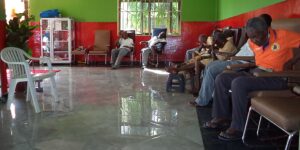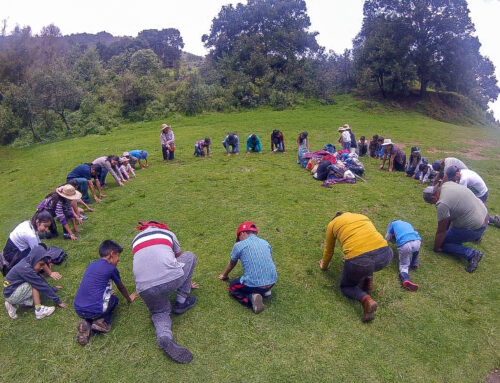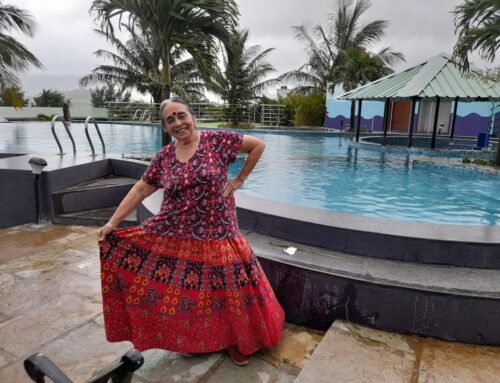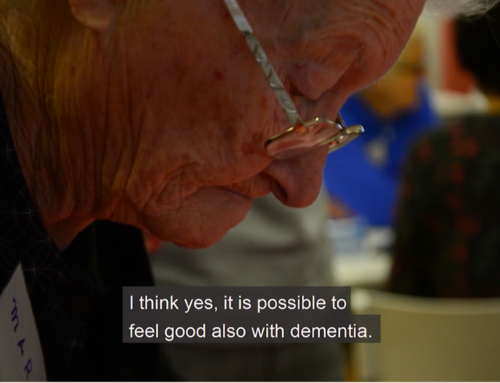Over many years, I watched Mabel Aboagyewa plan for her return to Ghana. As she approached the age of sixty-five, after living in the US for over forty years, she started to speak with excitement about returning, saying she would then be eligible to receive Social Security, or the state contributory pension system in the United States, in which monthly payments are pegged to one’s lifetime income. The room that she rented in a basement apartment in New Jersey was stuffed with boxes piled high to the ceiling, items which she planned to take with her. But, year after year, she delayed, saying that she would go “next year,” until at the age of seventy, she went “home.” The hesitation in returning was not unusual among aging Ghanaian migrants I met, but for most it seemed prompted by a desire to continue earning money, in order to accomplish one more project. In Mabel Aboagyewa’s case, however, she did not want to leave her community of friends and relations (both biological and adoptive) in New Jersey. Over the same interval, however, her body struggled to keep up with her physically demanding job of taking care of older adults in their homes.
When Mabel Aboagyewa returned to Ghana, she went to live in a family house in her hometown. She lived with more distant relatives in the same compound; closer relatives lived in nearby Accra and visited when they could. She had not been able to build a house—the goal of and expectation for migrants—due to her paltry wages as a home care worker. Those same low wages and precarious work made her reliant on US Social Security because she had few other savings and no pension from the agency. More importantly, the monthly Social Security payments were not enough to cover her expenses in the United States without continuing to work, whereas they would go further in purchasing power in Ghana. She could access her Social Security in Ghana through withdrawing money from a US bank account.
Twice after her return migration, she came to the United States for a short annual visit to see her doctor and re-supply her medications, covered by Medicare, the state universal health insurance for adults over the age of 65 in the US, and to which she felt entitled. I visited her in Ghana on two occasions, where she seemed to be slowly reconnecting with old friends, but also maintaining her difference as a return migrant, for example, by wearing culottes rather than a top (kaba) and long skirt (slit) tailored from wax print cloth (ntama) favored by Ghanaian women her age. She complained to me about how everyone wanted money from her “pension” when it was barely sufficient for her needs.
To my surprise, after about six years living in Ghana, in 2019, Mabel Aboagyewa returned to stay in the United States. Her relatives found her a place to live in senior housing, but she was unable to handle living there independently. After several psychiatric hospitalizations and a frightening episode in which she was found wandering around New York City, she was finally placed in a nursing home, under the auspices of Medicaid, a state program which pays for institutional care for those with few assets. In one of the worst long-term-care facilities in New Jersey, which lost many residents due to COVID-19, she survived the peak of the pandemic. It had been one of the only places that would accept her because of her combativeness, and it was located far from her nieces and nephews, who visited infrequently because of the distance. Mabel Aboagyewa’s return migration, and re-migration, in late life were clearly shaped by numerous issues, including her employment, family dynamics, and physical and mental health, but one of the factors that loomed large was the social protection she gained by living and working in the United States, and its comparative absence in Ghana.
What it means to age varies globally. Since the mid-twentieth century, the nation-state has become a major axis on which inequalities are constituted and maintained globally (Sharma 2020), including in life course transitions and aging. One of the ways that nation-states differ in ensuring their residents’ quality and longevity of life are in the measures of social protection they offer. Many social protection measures in the West are concentrated in the period of later life because the poverty and plight of older adults in Europe and North America provided much of the impetus for social welfare, as it could be framed as deserved social support for their earlier sacrifices and work (Skocpol 1992). Through political pressure, social protection was later extended to other vulnerable groups, generating legitimacy for the state during periods of political unrest and creating a source of capital for financial markets through pension funds (Maher and Aquanno 2022; Petersen and Petersen 2009).
Global inequalities provoke “crises” in migration, where individuals seek to redress the differences in their life chances and wellbeing through their spatial movement. Access to social protection is not often cited as a motivation for migration, although the differences in other countries’ social protection measures are often known. Migrants who have legal status, a relatively privileged group, can gain access to the social welfare protections of the country to which they move by virtue of meeting the requirements of living and working in that country for a period of time or by gaining citizenship. Those who move without legal authorization may contribute to Social Security through their work but never be able to access the benefits. Social welfare provisions become more important to migrants as they age.
Inspired by my friendship with Mabel Aboagyewa, my current research is exploring how aging migrants in the Ghanaian diaspora in Canada make decisions about their retirement and potential return migration. As in Mabel Aboagyewa’s story, I am finding that the different kinds of social protections available in different countries matter in aging migrants’ decision-making. Other research has argued that the fragmented quality of social protection for migrants from the Global South to countries in the Global North contributes to inequalities in their long-term health, social status, and ability to age independently (Böcker and Balkir 2015; Faist 2016). A recent New York Times article documents the struggles of older immigrants in New York City to retire and return (Hu and Singer 2024). State social protection is often oriented towards an “ideal subject” who meets particular bureaucratic criteria which migrants have trouble meeting (Bommes 2000; Faist 2016). For example, those who migrate to Canada in mid-life have difficulty attaining the minimum number of years of employment (forty) to qualify for the maximum benefits of state non-contributory pensions (Klassen 2013). Policy makers also assume that recipients are residents in the country (Baykara-Krumme 2013; Bolzman et al 2006). As we see in the case of Mabel Aboagyewa, some forms of US social protection—like Social Security—were accessible abroad, through mechanisms that allowed the international flow of money, while others—like Medicare and Medicaid—were territorially limited, as reimbursement payments were only given to health facilities and medical professionals certified, regulated, and located in the United States (see also Gilbertson 2009).
Furthermore, migrants are also more likely to work informally and cannot establish benefit rights without employment records; they are also more likely to work in precarious and low-wage jobs, because their educational credentials are not recognized. Migration can lead to downward mobility (Ameeriar 2017), thus reducing what one receives from contributory pensions. Difficulties in late life thus represent an accumulation of inequalities from throughout the life course. Thus, although migrants from the Global South may be legal citizens, they may not experience full social citizenship.
Social protection and social forms of care for the elderly beyond the family were scarce in Ghana, as I and others have detailed (Atobrah 2013, Coe 2021, Dovie 2022). Mabel Aboagyewa did not pursue national health insurance in Ghana, initiated in 2004 (Kotoh 2013), which covered most forms of medical care in government hospitals which many returning migrants distrust. Enabled by US Social Security payments, she might have been able to privately purchase care services similar to those she ended up receiving in the United States, such as care in a private health clinic or becoming a client of one of the growing commercial care services, like home care agencies and care homes, which particularly cater to aging return migrants and the aging parents of migrants abroad.

The common room of a care home, Accra, August 2018. Photo by the author.
In further research I have done among the aging Ghanaian diaspora in Canada, some plan to rely on these home care agencies or care homes in Ghana in the future. Yet others have decided to grow old in Canada, not only because of their greater faith in the Canadian healthcare system, but also because they want to live close to the children and grandchildren in whose wellbeing they are emotionally invested. Their decisions have implications for migrants’ sense of political belonging to Ghana and Canada.
Most people rely predominantly on care from family members wherever they live, regardless of state social protection and the availability of institutional and commercial care. However, migrants are more likely to engage in the patchworking of state and non-state resources, such as family, religious associations, community organizations, or commercial services, because of their greater difficulties accessing state forms of social protection (Levitt et al 2023). The patchworking is enabled by the fact that aging migrants can lay claim to different resources on the basis of different kinds of exchanges, with different criteria, geographic portability, and temporal horizons. Finally, the patchworking is responsive to changing care needs; for example, Mabel Aboagyewa made one arrangement during her initial retirement, which shifted as her dementia developed. Thus, in this research project, I aim to explore: how do migrants manage the constraints and resources they encounter in different social contexts, as their needs and aspirations for later life shift? Aging is a dynamic stage of the lifecourse. As people actively grapple with the personal changes they encounter, their dilemmas shed light on many wider social and structural phenomena.
References
Ameeriar, Lalaie. 2017. Downwardly Global: Women, Work, and Citizenship in the Pakistani Diaspora. Durham NC: Duke University Press.
Atobrah, Deborah. 2013. “Caring for the Seriously Ill in a Ghanaian Society: Glimpses from the Past.” Ghana Studies 15(16): 1-30.
Baykara-Krumme, Helen. 2013. “Returning, Staying, or Both? Mobility Patterns Among Elderly Turkish Migrants After Retirement.” Transnational Social Review: A Social Work Journal 3(1): 11–29.
Böcker, Anita and Canan Balkir. 2015. “Maintaining Dual Residences to Manage Risks in Later Life: A Comparison of Two Groups of Older Migrants.” In Transnational Aging: Current Insights and Future Challenges, edited by Vincent Horn and Cornelia Schweppe, 125-140. London: Taylor and Francis.
Bolzman, Claudio, Rosita Fibbi, and Marie Vial. 2006. “What to do after Retirement? Elderly Migrants and the Question of Return.” Journal of Ethnic and Migration Studies 32(8): 1359-1367.
Bommes, Michael. 2000. “National Welfare State, Biography, and Migration: Labour Migrants, Ethnic Germans, and the Re-ascription of Welfare State Membership.” In Immigration and Welfare: Challenging the Borders of the Welfare State, edited by Michael Bommes and Andrew Geddes, 90-108. London: Routledge.
Coe, Cati. 2021. Changes in Care: Aging, Migration, and Social Class in West Africa. New Brunswick: Rutgers University Press.
Dovie, Delali A. 2023. “Social Care for the Elderly: The Case of Selected Churches in Ghana.” In Contemporary Issues in Ageing in Africa: A Multidisciplinary Approach, edited by C. Charles Mate-Kole and Akye Essuman, 180-194. Accra: DigiBooks Ghana Ltd.
Faist, Thomas. 2016. “Transnational Social Protection in Europe: A Social Inequality Perspective.” Oxford Development Studies 45(1): 20-32.
Gilbertson, Greta. 2009. “Caregiving across Generations: Aging, State Assistance, and Multigenerational Ties among Immigrants from the Dominican Republic.” In Across Generations: Immigrant Families in America, edited by Nancy Foner, 135–160. New York: New York University.
Hu, Winnie and Jeffrey E. Singer. 2024. “Many Older Immigrants in New York Are Struggling: ‘I Have No Future.’” New York Times January 13, 2024.
Klassen, Thomas R. 2013. Retirement in Canada. Don Mills: Oxford University Press.
Kotoh, Agnes M. 2013. Improving Health Insurance Coverage in Ghana: A Case Study. Leiden: African Studies Centre.
Levitt, Peggy, Ken Chih-Yan Sun, Ruxandra Paul, and Erica Dobbs. 2023. Transnational Social Protection: Social Welfare Across National Borders. Oxford: Oxford University Press.
Maher, Stephen and Scott M. Aquanno. 2022. “The New Finance Capital: Corporate Governance, Financial Power, and the State.” Critical Sociology 48 (1): 55-73.
Petersen, Jørn Henrik and Klaus Petersen. 2009. The Politics of Age: Basic Pension Systems in a Comparative and Historical Perspective. Frankfurt am Main: Peter Lang.
Sharma, Nandita. 2020. Home Rule: National Sovereignty and the Separation of Natives from Migrants. Durham: Duke University Press.
Skocpol, Theda. 1992. Protecting Soldiers and Mothers: The Political Origins of Social Policy in the United States. Cambridge: Harvard University Press.
Cati Coe is Professor and Canada Research Chair in Migration and Care at Carleton University, Canada. She has researched transnational families, migrant elder care work, and changes in aging discourses and practices. Her latest books are Changes in Care: Aging, Migration, and Social Class in West Africa (Rutgers University Press, 2021) and The New American Servitude: Political Belonging among African Immigrant Home Care Workers (New York University Press, 2019).
Cite as: Coe, Cati. 2024. “Introduction”. In “Where to Age? Social Protection in Retirement and Return Decisions of Aging Migrants”, edited by Magdalena Zegarra Chiappori, American Ethnologist website, 7 August 2024. [https://americanethnologist.org/online-content/where-to-age-social-protection-in-retirement-and-return-decisions-of-aging-migrantsby-cati-coe/]




